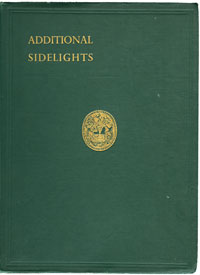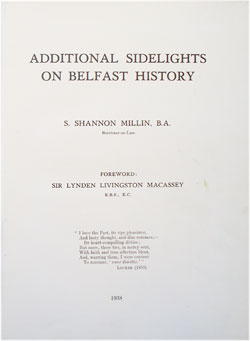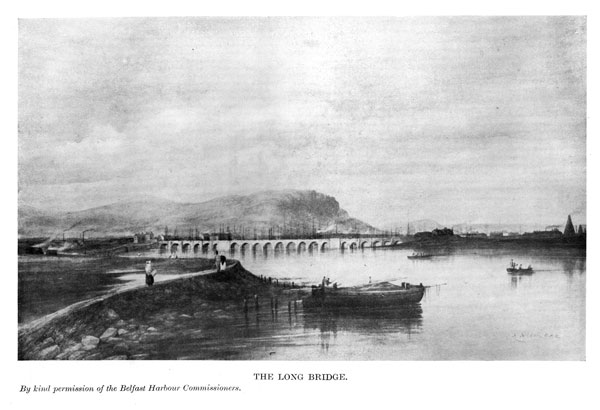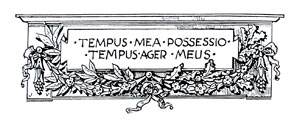
FOREWORD
-- -- -- -- -- -- -- --
TO
THE MEMORY OF
MY BROTHER
-- -- -- -- -- -- -- --
W. & G. BAIRD, LTD.
Belfast and London
1938.
-- -- -- -- -- -- -- --
It gives me the greatest pleasure, and I regard it as really a privilege, to be asked to contribute a foreword to this interesting and valuable book written, as it is, by my friend, Mr. Shannon Millin. There was undoubtedly a place waiting for it in the records of old Belfast.
Years ago there used to be a stereotyped item in military training, which has a moral. The men of a company were extended in line at a few paces apart. A simple little statement of fact was made verbally by the officer commanding the company to the man at one end of the line. That man was told to repeat it accurately to the man next him who again was told to repeat to his neighbour precisely what was said to him, and so on to the other end of the line. When the last man had repeated to the company commander what had been said to him, it was generally impossible to recognise the original message in the perversion of its final form. Perhaps things have now changed; I do not know.

And what is the moral? Let us consider for a moment. Each of the rank and file in the company was honestly trying to pass on precisely what was said to him. They were all able to ask their neighbour to repeat what he was saying if they did not grasp or understand it. Conditions, you would say, that were eminently calculated to ensure complete accuracy of transmission. How very different that, from the transmission from one generation to another of the facts of history, especially of local history. There is nothing like the same stringency of obligation on a man in one generation who constitutes himself a recorder of contemporary events to transmit with accuracy what he has learned or been told. Nor is there any strict duty of accuracy on the historian of the succeeding generation to inform himself completely and accurately of the information which was made available to him from the last generation and pass it on with accuracy to the next. Both are fancy-free and the result is that unless an historian makes it his business to examine into all the so-called "facts" of history and control his fancy and his prejudices, his record, however readable and interesting, may be far removed from truth.
The late Professor Hugo Munsterberg of Harvard University was always fond of shattering accepted traditions and beliefs. He used to describe to his intimates with glee, experiments which he had carried out to illustrate the fallibility of human testimony, a favourite topic of his. I remember that one was a seance which he had staged in a university lecture theatre. In it he placed twelve colleagues, all of them distinguished academical professors, drawn from different faculties, classics, mathematics, science, literature, etc. They were told that something dramatic would take place before them and each was asked to write a complete and exact record of the occurrence. Something did take place. Professor Munsterberg suddenly rushed into the theatre exhibiting all the obvious signs of terror, chased by another colleague brandishing several lethal weapons. A "rough and tumble" with much noise and shouting and struggling ensued. Then Professor Munsterberg disentangled himself from his assailant and rushed precipitately out of the theatre, savagely pursued by him. Here is the instructive sequel. If one examined the records, written by those twelve colleagues, of the occurrence, they differ so radically in their accounts of what took place, the order in which things did take place, what was shouted, the nature of the struggle and so forth, that it is almost impossible to believe that they are descriptions of the same episode. Yet each was genuinely intended to be a complete and accurate and synthetised record of what was seen and heard by an exceptionally able and well-trained observer. When that can happen with such highly-qualified and competent recorders, what then cannot happen with historians, especially local historians, who feel free to write history as their fancy impels them, or their local loyalties or family prestige incline them, none of them being under any duty of probing down into, and finding out, the real truth and then and not until then recording it.
At one time it was my good fortune to be associated with one who was an eminent archaeologist and well-known historian. He had laid himself out to pursue a particular line of historical research of very great national interest and importance. His one determination was to get the facts out, clear of all dross of fancy and distortion, extricated from all encrusted fiction. There was no mistaking that a fact was a fact when he pronounced it to be such. The tests and criteria which he applied left no room for controversy. To me it was a revelation to hear him expatiating on some of what he called "The Accepted Fictions of History", showing how fancy gradually became fiction, and fiction in course of time became "fact" and "fact" became recognised history. All of his more important researches have not yet been published. Sometimes it is not politic to destroy the foundations of popular belief. But for their publication some day in the future I understand arrangements have been made.
More especially is it in connection with local history, that is to say the history of a locality, its local institutions, its development, the evolution of its local affairs, that all the circumstances and influences that make for inaccurate and misleading history have the fullest play. That has been demonstrated by my friends, Mr. Sidney Webb (Lord Passfield) and his gifted wife, Beatrice Webb. They have practically re-written the local history of England by the application of their brilliantly developed technique of unearthing, collating and then most meticulously comparing and checking local records down to apparently the most trivial and immaterial documents. No one will contradict me when I say that much of the accepted history of the local life of England was proved to be largely myth and fiction when put into the crucible of their truth-refining laboratory. The repercussions of their researches have been amazingly widespread. They have produced reactions of a most valuable character in all spheres of municipal, local government and poor-law administration, industrial organisation, economics and also national government.

I decline to regard the history of a city as merely a matter of antiquarian interest. It far exceeds that. I equally decline to regard it as merely something of cultural interest for the dilettanti of the district. In my opinion an informed and accurate knowledge of the history -- I mean by that of the true origins and of the true evolution and development of his city -- is a vitally important part of the mental equipment of every loyal citizen. For those charged with the administration of its affairs it is in every sense essential. Without a knowledge of the past there can only be piecemeal and opportunist provision for the future; certainly nothing in the shape of rationally planned local government. I therefore welcome enthusiastically those "Additional Sidelights on Belfast History" by Mr. Shannon Millin. The City of Belfast has been so intimately and directly connected with the Province of Ulster, in all its vicissitudes and throughout the whole of that Province's more recent development, that the history of Belfast is very largely the story of modern Ulster.
This book is not merely most interesting and educative, it has the outstanding qualities of a reliable history, being written by one whose sole object is the ascertainment of truth, and who has a healthy horror of fancy and fiction. The book will have its critics. Its author has long sworn fealty and proclaimed his devotion to historical truth, and, under pledge of service to her, has boldly sallied forth to challenge error, even in high places. Some readers will resent any attack upon accepted a.d conventional local traditions. Old beliefs cling tenaciously like ancient ivy. But Mr. Shannon Millin's forays on the inaccuracies of Belfast history, when he is forced to make one, are always conducted with chivalrous intent and made with knightly weapons, the arms and methods of the scientific historian. Before, therefore, any readers are minded to break a lance with him in refutation of any of his statements, they would be well advised first to "check up" upon their own. If they do not, however much I may respect their courage, I am inclined to think that it will merely serve to vindicate the value of the book and the opportuneness of its publication. It is entitled, in my opinion, to a cordial and grateful welcome by the City Fathers and citizens of Belfast. I wish it all success.



